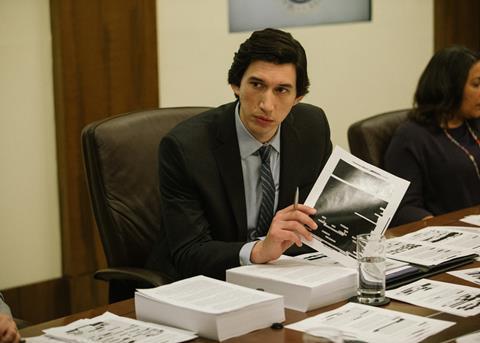A well-made political drama starring Adam Driver about the CIA’s post-911 torture programme

Dir/scr: Scott Z. Burns. U.S. 118 min. 2018.
To be fully accurate, the film is initially called The Torture Report, but in a clever play on titling, the word “torture” is quickly redacted from the title credit. The Report may be a more suitable name for this proficient political drama, anyway: straightforward, detailed, and unflashy, the film provides an engaging account of the Senate Intelligent Committee’s investigation into the CIA’s post-9/11 Detention and Interrogation Program, and the one man, Senate staffer and lead investigator Daniel Jones (Adam Driver), who remained committed to the cause for over five years.
The Report pulls back the curtain on America’s political machinations and one of its most appalling policy decisions and attempted cover-ups with startling clarity
The Report is well-made entertainment for political wonks. Writer-director Scott Z. Burns, Soderbergh’s go-to screenwriter (The Informant!, Contagion, Side Effects), lacks his frequent collaborator’s tendency for paranoid aesthetics or hand-held urgency, instead favouring a more low-key filmmaking style that offers up less of a political thriller and more of a fact-finding procedural. But even if it’s not the most exciting or emotional movie, the high-profile cast, with Driver and Annette Benning as a tight-lipped Senator Diane Feinstein, should ensure that The Report sees decent sales on theatrical and ancillary platforms.
Jones’ work on the torture investigation officially begins in 2009—and in Feinstein’s initial briefing, it’s meant to be conducted with no bias or political partisanship. But as the film will make eminently clear, there is no such thing as impartiality in Washington. Working in a sterile basement in a 1970s-style concrete block of a building, Jones sets out to do his job, but he quickly learns there will many obstacles along the way. Not least of which is the fact there’s initially no paper in his office. “But paper is how we keep track of laws,” he quips.
The film’s first half flashes back and forth between Jones’ research and post-9-11 incidents within the CIA’s Counter-terrorism Center and the black sites where the most extreme acts of torture were committed by US agents. Burns paints the two psychologists who dreamt up the “enhanced interrogation techniques” and sold them to the CIA as inexperienced con artists, whose plans to use water-boarding, sleep deprivation, and “learned helplessness” weren’t based on any scientific evidence or experience. It’s an infuriating and shocking portrayal, made all the more so because it’s based on fact. In another startling reveal, Jones notes that one man was water-boarded 183 times.
When Jones stumbles onto an incident in which a detainee was murdered, he becomes more unhinged and obsessed with not only finishing the report, but in the film’s second part, the struggle to make the epic 7,000-page investigation public—which comes with its own complications in the Obama era. (Mainly due to the fact that George W. Bush’s CIA deputy executive director John O Brennan, the film’s villain, if there is one, was appointed Director of the CIA by President Obama.) The Report then turns into a game of brinkmanship between competing sections of the government, the White House vs. the Congress, with Daniel Jones stuck in the middle and trying to find a way forward without being framed, persecuted, or scapegoated.
Driver makes for a compelling audience surrogate, though he’s not a fully drawn character so much as a type – the solitary and workaholic whistleblower trying to do the right thing. Burns has chosen to leave Jones’ entire personal life completely absent from the film, and he never really breaks a sweat throughout the whole ordeal. Similarly, Jones’s relationship with Feinstein is purely perfunctory. For her part, Benning is also all business, playing the Senator with utter seriousness.
If Jones is purely a cipher, maybe that’s the point: we go along for the ride, sharing with his frustrations and rooting for him when he exposes the indignities of the executive branch of the U.S. government. Over the course of the film, Driver makes a handful of exacting or impassioned remarks, which, for the right — or more accurately, the left — audience, will be rousing.
In one brilliant takedown, he corrects a rival who misattributes the quote “History is written by the victors” as spoken by Winston Churchill. But Jones is quick to correct him; the phrase was likely inspired by the more politically loaded Hermann Goring quote: “We will go down in history either as the world’s greatest statesmen or its worst villains.”
It’s intelligent and clever scripting, and except for a few moments where the dialogue is overly expository, as if Burns doesn’t trust his audience, The Report pulls back the curtain on America’s political machinations and one of its most appalling policy decisions and attempted cover-ups with startling clarity. Without naming current CIA. director Gina Haspel directly by name, the film makes a strong case for her complicity, and the continuing lack of accountability that likely exists.
Production Company: VICE Media, Unbranded Pictures
International Sales: Mad River, amanthad@madriverpics.com
Producers: Steven Soderbergh, Jennifer Fox, Scott Z. Burns, Kerry Orent, Michael Sugar, Danny Gabai, Eddy Moretti
Production Design: Ethan Tobman
Editor: Greg O’Bryant
Cinematography: Eigil Bryld
Music: David Wingo
Main cast: Adam Driver, Annette Bening, Jon Hamm, Ted Levine, Maura Tierney, Michael C. Hall

























No comments yet